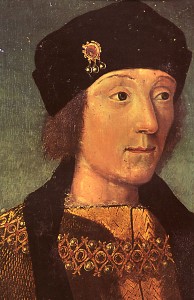 On 30th October 1485, Henry Tudor, 2nd Earl of Richmond and son of Lady Margaret Beaufort and the late Edmund Tudor, 1st Earl of Richmond, was crowned King Henry VII at Westminster Abbey.
On 30th October 1485, Henry Tudor, 2nd Earl of Richmond and son of Lady Margaret Beaufort and the late Edmund Tudor, 1st Earl of Richmond, was crowned King Henry VII at Westminster Abbey.
Chronicler Edward Hall recorded:
"After this he with great pompe was conueighed to Westmynster, and there the thirtye daye of Octobre was with all ceremonyes accustomed, enoynted & crouned kyng by the whole assent as well of the comons as of the nobilite, . & was named kyng Henry the. vij. of that name, which was in the yere of our redempcion. M. cccc. Ixxxvi.Frederyke the. iii. then beynge Emperouv of Almayne, Maximilian his sonne then beynge newely elected kyng of Romanes, Charles the. viij. reignyng ouer the Frenche nacion, & James the iij. rulyng the realme of Scotland. Which kyngdorne he obteyned & enioyed as a thyng by God elected & prouided, and by his especiall fauoure & gracious aspecte compassed and acheued. In so muche that men comonly reporte that. vii. C. xcvii. yeres passed, it was by a heauenly voyce reueled to Cadwalader last kyng of Brytons that his stocke and progeny should reigne in this land and beare domynion agayn: Wherupon most men were persuaded in their awne opinion that by this heauenly voyce he was prouided & ordeyned longe before to enioye and obteine this kyngdom, whiche thing kyng Henry the. vi. did also shewe before as you haue heard declared."
Chronicler Raphael Holinshed wrote:
"[...] with great pompe he rowed unto Westminster, & there the thirtith daie of October he was with all ceremonies accustomed, anointed, & crowned king, by the whole assent as well of the commons as of the nobilitie, & called Henrie the seaventh of that name: which was in the yeare of the world 5452, and after the birth of our Lord 1485, in the fortie and sixt yeare of Frederike the third then emperour of Almaine, Maximilian his sonne being newlie elected king of the Romans, in the second yeare of Charles the eight then king of France, and in the fiue and twentith of king James then ruling the realme of Scotland."
John Fisher, Bishop of Rochester and confessor and chaplain to Lady Margaret Beaufort, wrote of Margaret's reaction to her son's coronation:
"For whan the kynge her sone was crowned in all that grete tryumphe & glorye, she wepte meruayllously [marvellously]."
Historian Thomas Penn notes that his coronation was the occasion when Henry was reunited with his mother after fourteen years of separation. What an emotional day it must have been for both of them.
Henry, of course, had become king after defeating Richard III at the Battle of Bosworth on 22nd August 1485.
Notes and Sources
- Hall's Chronicle, p423.
- Holinshed's Chronicle (1587 edition), Volume 6, p762
- The English Works of John Fisher: Bishop of Rochester, p305-306.
- Penn, Thomas (2011) Winter King: Henry VII and the Dawn of Tudor England, Penguin, p11



Tyrant tydder
Henry Tudor was not a tyrant. I am a Ricardian and even I know to read the evidence before judging a King a tyrant. He was actually a fairly well balanced King. He was a cautious man, he made an effort to incorporate the ancient families of York and Lancaster and their supporters into his Court and Regime. He did face several years of opposition and many people supported his two main rivals, one Lambert Simnel, a dupe used by John de la Pole as Edward, Earl of Warwick or Edward vi, depending on the contemporary evidence, plus the man who claimed to be Richard of Shrewsbury, Duke of York, younger son of Edward iv whom history called Perkin Warbeck.
Henry later became paranoid after the loss of his wife, Elizabeth of York and his eldest son, Prince Arthur, especially being unpopular in London as he used bribes and fines to control his nobles, the merchants and commerce. His fines crippled people. Maybe had he been a tyrant, he would have totally ignored the law and used execution instead. Most people when they use the word tyrant don’t even understand the legal implications of this phrase. They trot it out as if they are an expert, when often the opposite is true. A tryrant in the ancient world was a legitimate ruler given the right to rule without restraint or to use oppressive measures as an act of security. A ruler who would be a tyrant in English or French definition is given absolute power to rule without the need to refer to legal proceedings or who disrespected such institutions. A ruler who was excessively oppressive or harsh would also be covered under more modern definitions. If either Henry Vii or more commonly his son, Henry Viii whose last decade show what is regarded as tyrannical rule, were truly tyrants, they wouldn’t have passed legislation to back them up or bothered with Parliament, law Courts or any lawful process at all. There is no justification for Henry Tudor being called a Tyrant let alone Richard iii and whether his son became one is widely open to interpretation.
Henry’s coronation was a regal and grand affair, although not as grand as that of Richard iii and Anne Neville or his son’s with Katherine of Aragon. It was grand enough to make people wake up and realise a new Dynasty had been formed, that Henry was the new legal King, won on the Battlefield and anointed by God. However, it had some restraint as Henry was still wise and aware enough to know that he wasn’t automatically or universally accepted. Henry had to also show that he gained the crown in his own right and person and not just via his wife to be. His new aim was to do something more spectacular, reverse the legal status of his promised wife, Elizabeth, daughter of the late King Edward iv who had been declared illegitimate. He had to be crowned first, then call Parliament. He now called that Parliament, had the Titular Regis reversed, making Elizabeth legitimate again, applied to the Pope for permission to marry his cousin and the couple were finally married in January 1486.